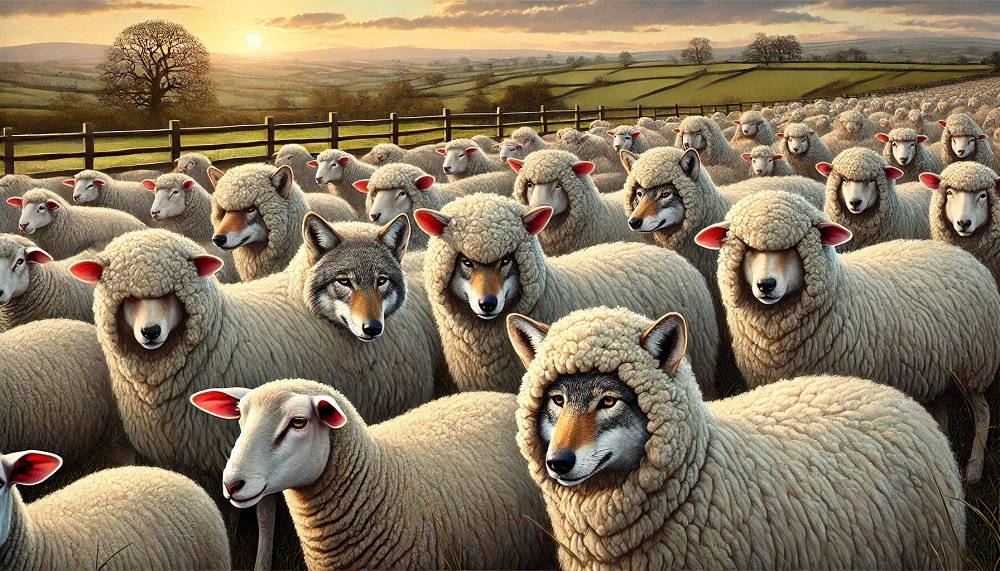A review of John A. Shivik, Mousy Cats and Sheepish Coyotes: The Science of Animal Personalities, (Beacon Press, 2017)
Economists can learn a lot from non-economists. Biologist and animal rescuer John Shivik’s charming 2017 book Mousy Cats and Sheepish Coyotes is an excellent example. He, likely unintentionally, offers two deep insights for economists. First, Shivik shows that individual dignity is important, and not just for humans. Second, he offers vivid examples of equilibrium as a process, rather than an end state.

Shivik’s opening sentence sets the tone: “My cat, for all practical purposes, is an asshole.” Though a self-described dog person, Shivik reluctantly opens his heart to this unwelcome cat as his unique personality emerges. They communicate, develop routines, and bond with each other in ways no other two individuals could.
As with our pets, so with other species. Shivik’s later stories of tagging coyotes and working with other animals are more vivid and less heartwarming, but are just as instructive in how different individual animals can be. They are unique, dignified individuals, same as humans.
Economists can learn from this. The homo economicus species that inhabits economists’ perfect competition models is an automaton. It has no individuality and no free will. Its sole purpose is to maximize utility. It has all the individual personality of an equation. This lifeless view of humans is similar to the mechanistic view that Shivik warns against when it comes to other animal species.
Humans have built civilizations and sent ourselves to space. Thanks to the written word, we can send messages thousands of years into the future. No automaton could have done this. People had to come up with new ideas. They had to build upon others’ work. They had to persuade other people that their new innovations were worthwhile. It took people demanding to be treated with dignity and agency, and treating others that way in return. In short, it takes personality.
While humanity’s accomplishments go beyond other species, our differences with them are more of degree than of kind. Our individuality is far older than we are. This long heritage, which is millions of years older than our species, makes the case for individual dignity even stronger than most classical liberal economists already believe.
A fascinating question that Shivik discusses frequently, but does not develop fully, is why one personality type never dominates an entire species. In any given species, some individuals are more timid, and some are more aggressive. If one personality type consistently outcompeted the other, then the less fit personality type would go extinct. This almost never happens. Why is that?
If every individual is aggressive, their species will die out because they spend too much energy fighting each other over status, mates, and food, leaving too little left over for finding those things in the first place. This type of environment creates an opening for more timid members on the sidelines to pass on their genes.
The same thing applies at the other end of the spectrum. An all-timid species might starve or go extinct because its members would not take enough chances. This would provide a natural opening for more aggressive personalities to take food and mates for themselves.
Instead of one personality type dominating, both always coexist. Shivik never uses economic terminology, but this is a fantastic example of a natural equilibrating process. Somewhere, Walras is smiling.
At the same time this push-and-pull process is going on, natural periods of abundance and scarcity also constantly shift the advantage between aggressive and timid personality types.
Aggressive personalities might survive better during hard times, because they are better at fighting over scarce resources. Timid individuals might do better during abundant periods, because by avoiding conflict they tend to live longer.
Shivik hasn’t just unintentionally described a static equilibrium model, he shows a dynamic equilibrium process that adapts to changing circumstances. Diverse individualism is an effective survival strategy, which is why nearly every species has it.
This is a fascinating insight, and an astute biologist or economist could spend a career exploring it. Instead of equilibrium generating uniformity, it generates all the unique individual traits we see in all animal species, not just humans.
Personality types work a little bit like a cartel model in economics, which is a special case of equilibrium at work. Members of a cartel agree to restrict supplies and artificially raise prices. This opens opportunities for non-members to enter the market and take away the cartel’s customers by offering lower prices.
The higher the cartel price, the more that non-members can profit. It also becomes more likely that cartel members will cheat on their agreement by boosting supply or lowering prices.
This is why cartels like OPEC cannot sustain themselves without government help. Absent that interference, prices will return to equilibrium market levels.
Now substitute the word “aggressive” for “cartel member” and “timid” for “non-member,” or vice versa. The dynamic is pretty similar for different animal personalities within a species. If one personality type dominates, that creates openings for the other type, and then that dominance goes away. Any dominance that does emerge is temporary.
This review has only explored simplified two-personality-type models. Shivik uses the Briggs-Meyers personality test throughout the book, which has four dimensions. He introduces the reader to individual animals that vary along all four dimensions, and to varying degrees. Just as every human is unique, so are all other animal species.
While an enterprising economist could build all sorts of sophisticated models around the insights Shivik touches on, the most important lesson from his book is his reminder of the importance of individual dignity, for both humans and animals.
Our human individuality did not come from a vacuum. It emerged from a long evolutionary process. Diversity isn’t just an ingredient of humanity, it is an ingredient of life itself.
Ryan Young is senior economist at the Competitive Enterprise Institute.
